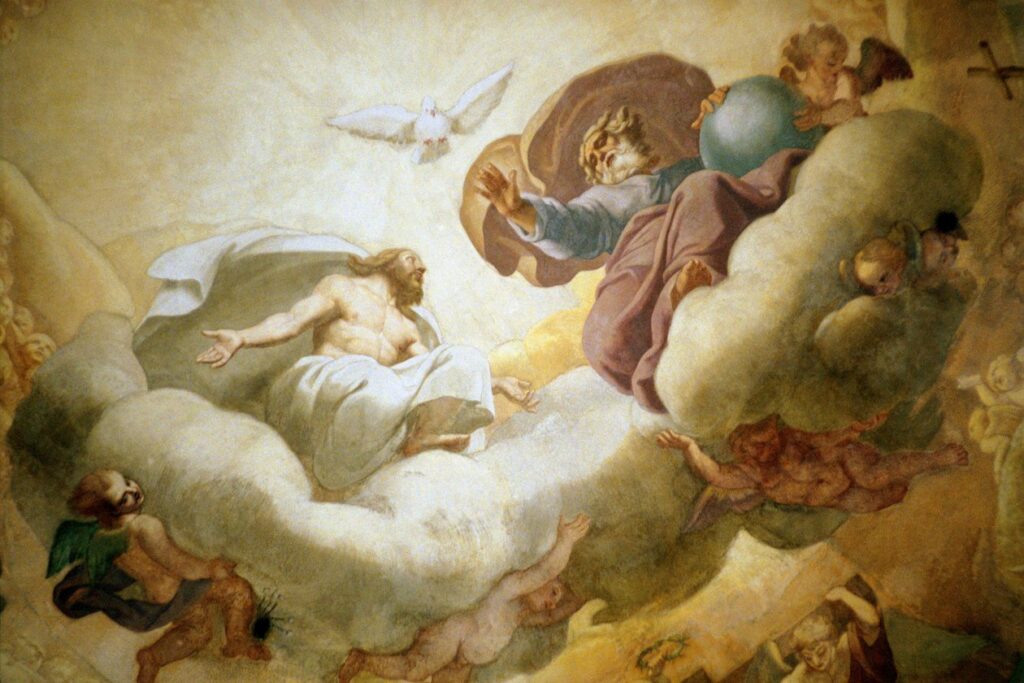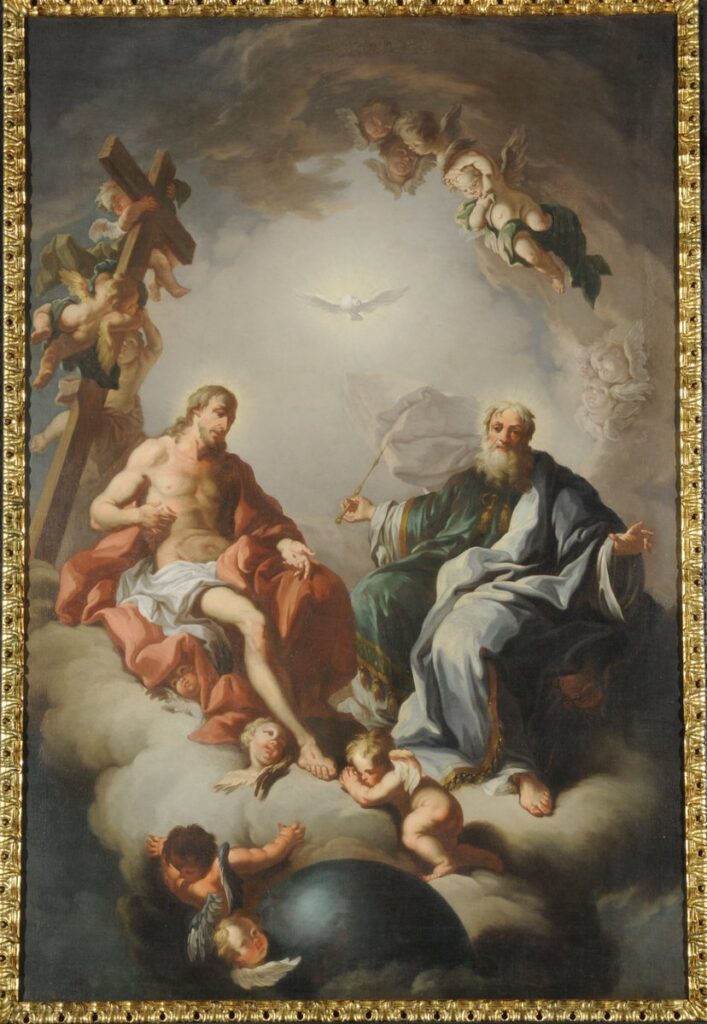Continuation of the Holy Gospel According to Matthew (Matt 28:18-20)
At that time, Jesus said to His disciples, All power is given to Me in heaven and on earth. Go therefore, teach ye all nations, baptizing them in the name of the Father and of the Son and of the Holy Spirit, teaching them to observe all things whatsoever I have commanded you. And behold I am with you all days, even to the consummation of the world.
A Message From St. John Chrysostom’s Homilies on Matthew: No. 90
Then the eleven disciples went away into Galilee, and some worshipped, and some when they saw Him doubted ( Matt 28:15).
This seems to me to be the last appearance in Galilee, when He sent them forth to baptize. And if “some doubted,” herein again admire their truthfulness, how they conceal not even their shortcomings up to the last day. Nevertheless, even these are assured by their sight.
What then saith He unto them, when He seeth them? All power is given unto me in heaven and on earth (Matt 28:16-17). Again, He speaketh to them more after the manner of man, for they had not yet received the Spirit, which was able to raise them on high. Go ye, make disciples of all nations, baptizing them in the name of the Father, and of the Son, and of the Holy Ghost: teaching them to observe all things whatsoever I have commanded you (Matt 28:18); giving the one charge with a view to doctrine, the other concerning commandments. And of the Jews He makes no mention, neither brings forward what had been done, nor upbraids Peter with his denial, nor any one of the others with their flight, but having put into their hands a summary of the doctrine, that expressed by the form of baptism, commands them to pour forth over the whole world.
After that, because he had enjoined on them great things, to raise their courage, He says, Lo! I am with you alway, even unto the end of the world (Matt 28:18-19). Seest thou His own proper power again? Seest thou how those other things also were spoken for condescension? And not with those men only did He promise to be, but also with all that believe after them. For plainly the apostles were not to remain here unto the end of the world; but he speaks to the believers as to one body. For tell me not, saith He, of the difficulty of the things: for I am with you, who make all things easy. This He said to the prophets also in the Old Testament continually, as well to Jeremiah, objecting his youth (cf. Jer 1:6, 8), as to Moses (cf. Exo 4:10, 12) and Ezekiel (cf. Ezk 2, 3.) shrinking from the office, I am with you, this here also to these men. And mark, I pray thee, the excellence of these, for the others, when sent to one nation, often excused themselves, but these said nothing of the sort, though sent to the world. And He reminds them also of the consummation, that He may draw them on more, and that they may look not at the present dangers only, but also at the good things to come that are without end.
“For the irksome things, saith He, that ye will undergo are finished together with the present life, since at least even this world itself shall come to an end, but the good things which ye shall enjoy remain immortal, as I have often told you before.” Thus having invigorated and roused their minds, by the remembrance of that day, He sent them forth. For that day to them that live in good works is to be desired, even as on the other hand to those in sin, it is terrible as to the condemned.
But let us not fear only, and shudder, but let us change too, while there is opportunity, and let us rise out of our wickedness, for we can, if we be willing. For if before grace many did this, much more after grace.
For what grievous things are we enjoined? to cleave mountains asunder? to fly into the air? or to cross the Tuscan sea? By no means, but a way of life so easy, as not so much as to want any instruments, but a soul and purpose only. For what instruments had these apostles, who effected such things? Did they not go about with one vestment and unshod? and they got the better of all.
For what is difficult of the injunctions? Have no enemy. Hate no man. Speak ill of no man. Nay, the opposites of these things are the greater hardships. But He said, you reply, Throw away thy money. Is this then the grievous thing? In the first place, He did not command, but advised it. Yet even if it were a command, what is it grievous not to carry about burdens and unseasonable cares?
But oh covetousness! All things are become money; for this cause all things are turned upside down. If anyone declares another happy, he mentions this; should he pronounce him wretched, hence is derived the description of wretchedness. And all reckonings are made on this account, how such an one gets rich, how such an one gets poor. Should it be military service, should it be marriage, should it be a trade, should it be what you will that any man takes in hand, he does not apply to what is proposed, until he see these riches are coming in rapidly upon him. After this shall we not meet together and consult how we shall drive away this pest? Shall we not regard with shame the good deeds of our fathers? of the three thousand, of the five thousand, who had all things common?
What is the profit of this present life, when we do not use it for our future gain? How long do ye not enslave the mammon that hath enslaved you? How long are ye slaves of money? How long have ye no love for liberty, and do not rend in pieces the bargains of covetousness? But while, if ye should have become slaves of men, you do all things, if any one should promise you liberty; yet being captives of covetousness, ye do not so much as consider how ye may be delivered from this bitter bondage. And yet the one were nothing terrible, the other is the most bitter tyranny.
Consider how great a price Christ paid for us. He shed His own blood; He gave up Himself. But ye, even after all this, are grown supine; and the most grievous thing of all is, that ye even take delight in the slavery, ye luxuriate in the dishonor, and that, from which ye ought to flee, is become an object of desire to you.
But since it is right not only to lament and to blame, but also to correct, let us see from what cause this passion and this evil have become an object of desire to you. Whence then, whence hath this come to be an object of desire? Because, thou sayest, it makes me to be in honor and in security. In what kind of security, I pray thee? In the confidence, not to suffer hunger, nor cold, not to be harmed, not to be despised. Wilt thou then, if we promise thee this security, refrain from being rich? For if it is for this that riches are an object of desire, if it be in your power to have security without these, what need hast thou of these any more? “And how is it possible,” thou sayest, “for one who is not rich to attain to this?” Nay, how is it possible (for I say the opposite thing) if one is rich? For it is necessary to flatter many, both rulers and subjects, and to entreat countless numbers, and to be a base slave, and to be in fear and trembling, and to regard with suspicion the eyes of the envious, and to fear the tongues of false accusers, and the desires of other covetous men. But poverty is not like this, but altogether the contrary. It is a place of refuge and security, a calm harbor, a wrestling ground, and school of exercise to learn self-command, an imitation of the life of angels.
Hear these things, as many as are poor; or rather also, as many as desire to be rich. It is not poverty that is the thing to be feared, but the not being willing to be poor. Account poverty to be nothing to fear, and it will not be to thee a matter for fear. For neither is this fear in the nature of the thing, but in the judgment of feeble-minded men. Or rather. I am even ashamed that I have occasion to say so much concerning poverty, to show that it is nothing to be feared. For if thou practise self-command, it is even a fountain to thee of countless blessings. And if any one were to offer thee sovereignty, and political power, and wealth, and luxury, and then having set against them poverty, were to give thee thy choice to take which thou wouldest, thou wouldest straightway seize upon poverty, if indeed thou knewest the beauty thereof.



